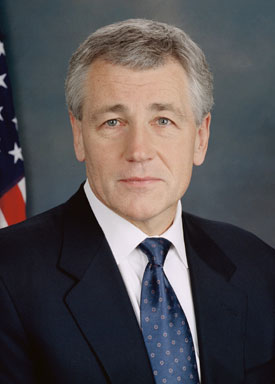
Cross-posted at Daily Kos
The White House is now calling former Republican Senator Chuck Hagel a “solid” candidate for Defense Secretary, per the Washington Post. And certainly Hagel, who emerged as an opponent to Bush’s bloody, wasteful Iraq War, has some things going for him.
But it’s important to consider his entire career in making such a choice — including Hagel’s fierce and tragically successful efforts to kill the Kyoto climate treaty in the U.S. Senate.
Hagel was a Congressional observer in Kyoto during the negotiations over the landmark climate change treaty in 1997. His position on Kyoto was never ambiguous: “We will kill this if the president signs it.” Or as he put it a few years later, in over-the-top language in support of the Bush administration’s limp approach to the issue:
The Kyoto Protocol would have eliminated millions of jobs in America. It would have driven our economy downward. It would have eliminated opportunities for investment, such as clean energy technology, in developing countries. It would have driven a stake through any hope of prosperity for America.
Beyond just talk, Hagel swung into action back in 1997, partnering with coal-friendly former Senator Robert Byrd (D-WV) to pre-empt any Senate action on the treaty with the now-infamous Byrd-Hagel Resolution.
Hagel and Byrd focused on the most controversial aspects of the Kyoto treaty as a way to sink the whole ship. The resolution said that the US should not be a signatory to a climate change treaty that excluded developing nations and could hurt the US economy. This motherhood-and-apple-pie language passed 95-0. The Bush administration subsequently used the passage of this resolution to justify it’s withdrawal from the Kyoto treaty in March 2001 and its refusal to take any action on global warming.
Then-Senator Hagel was effusive in his praise of the Bush administration for this act, which set back global progress in confronting climate change in ways from which the world has still not recovered. At the time, Hagel told CNN that Bush had “brought some honesty” to the issue: “He has set aside the charade of Kyoto and he is saying we can do it in a better way, a more responsible way.” (What was that more responsible way, by the way? It’s lost to history, apparently.)
Around the same time, when Bush’s first EPA Administrator, Christie Todd Whitman, proposed regulating carbon dioxide emissions, Hagel wrote a letter to the president asking for “clarification” of the administration position on this issue. Former Treasury Secretary Paul O’Neill wrote in his book, The Price of Loyalty, that Hagel did so at the prompting of Dick Cheney. Bush’s letter in response was used inside the administration as a tool to slap down Whitman for suggesting such a policy – even though Bush himself had proposed CO2 regulation during the 2000 campaign.
While Hagel has tried to portray himself as a moderate on climate change, he has in the past spoken at climate change denier conferences. And even as late as 2005, in an interview with Grist, Hagel was still raising doubts about climate science: “We’ve known we’ve had an impact, absolutely, but exactly what impact human society has had on climate we’re not quite sure.” In the same interview, he made clear that he opposed all mandatory policies on the issue — including the McCain-Lieberman bill then alive in the Senate — as opposed to relying solely on the magic of the marketplace:
Any time you put mandatory caps on any program – which I’m opposed to – you are going to have a consequence from that, and I don’t think it’s going to be a good consequence. You will lower productivity standards, you will lower efficiency standards, you will lower job choices, and you will lower the whole quality economic dynamic when you try and artificially cap energy use.
Is all of this disqualifying? Just consider how future generations will judge the leaders of our time, when we had the opportunity to slow the rise in temperatures and all the related Katrina/Sandy-sized disasters that will ensue — and those leaders chose to obstruct and play politics, in accord with the interests of their Big Oil and Big Coal donors, rather than do ANYTHING of consequence about the issue.
The U.S Defense Department has a larger environmental footprint than any organization on the planet. It also must, to be truly strategic and forward-looking, incorporate climate change into all of its planning. What DOD does on the issue will be of enormous consequence — and under this administration, the Army and Navy have both taken strong steps to start to reduce their footprints.
Will Defense Secretary Hagel rein in these efforts as getting ahead of the “free market”? Will he kill efforts to incorporate climate change in DOD strategic planning because the science is “uncertain”? Will he be a voice in White House debates to continue the tradition to which he has so substantially contributed, of the US doing nothing but delay, delay, delay getting serious about this global threat?
All of these questions need to be asked, both by those considering Hagel’s nomination, and those who may be asked to approve it. Because we cannot afford any more delay in tackling climate change, and anyone who counsels such must be simply and completely pushed out of the way.

![[UPDATED with Official Announcement] Audio: VA Del. Dan Helmer Says He’s Running for Congress in the Newly Drawn VA07, Has “the endorsement of 40 [House of Delegates] colleagues”](https://bluevirginia.us/wp-content/uploads/2026/02/helmermontage.jpg)
















